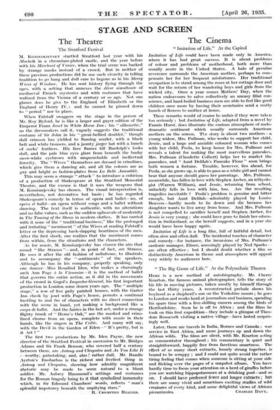STAGE AND SCREEN The Theatre
The Stratford Festival M. KOMISARJEVSKY startled Stratford last year with his Macbeth in a chromium-plated castle, and the year before with his Merchant of Venice, when the trial scene was backed
by strange masks instead of a crowd. But in neither of these previous productions did he use such vivacity in telling
tradition to go hang and dull care to begone as in his Merry Wives of Windsor. He has sent history flying through the ages, with a setting that annexes the decor simultanee of mediaeval French mysteries and with costumes that have waltzed from the Vienna of a century or so ago. Not one glance does he give to the England of Elizabeth or the England of Henry IV.: and he cannot be pinned down to " period " nor to place.
When Falstaff swaggers on the stage in the person of
Mr. Roy Byford, he is like a larger and gayer edition of the Emperor Franz Josef in White Horse Inn : his " silhouette,"
as the dressmakers call it, vaguely suggests the traditional costume of Sir John in his " great-bellied doublet," though dull crimson has yielded to flaming scarlet, with a black
belt and white trousers, and a jaunty jaeger hat with a bunch
of cocks' feathers. His face flames till Bardolph's looks dull, and the pale blue eyes glare from beneath the bushy
snow-white eyebrows with unquenchable and ineffectual ferocity. The " Wives " themselves are dressed in crinolines, which give them a dancing air, and all the colours are as gay and bright as fashion-plates from La Belle Assemblee.
This may seem a strange " attack " to introduce a criticism of a production of Shakespeare at the Stratford Memorial Theatre, and the excuse is that it uses the weapons that M. Komisarjevsky has chosen. The visual interpretation is, nevertheless, not decorative but basic ; he has regarded Shakespeare's comedy- in terms of opera and ballet—no, of
opera et ballet—an opera without songs and a ballet without (lancing. The text itself is authentic, with no alterations
and no false values, such as the sudden upheavals of modernity
in The Taming of the Shrew in modern clothes. It has carried with it none of the " traditional business," like the prolonged
and irritating " merriment " of the Wives at reading Falstaff's letter or the depressing back-slapping heartiness of the men. Aftei the first shock, one realikes that the merriment comes from within, from the situations and the characters.
As for music, M. Komisarjevsky has chosen the airs that sound " like Strauss "—and, in point of fact, are Stiauss.
He uses it after the old fashion of melodrame, to illustrate and to accompany the " sentiments." of the speakers. Although he has in his company, properly speaking, only
one dancer—Miss Rosalind Iden, who makes a charMingly
arch Ann Page a la Viennoise—it is the method of ballet that governs the entire action, as it did in the movements of the crowd in Gogol's Inspector-General, his first important
production in London some dozen years ago. The " multiple stage," a row of five gaily painted houses, with the Garter Inn cheek by jowl with Page's, house, permits a continual
bustling to and fro of characters with no direct connection with the scene in hand, yet making a background like a corps de ballet. And the fairies in the last act, under a strange
flighty trunk of " Herne's Oak," are the masked and crino- lined chorus from an opera, complete with music in their
hands, like the singers in The Critic. And many will say, with the Devil in the Garden of Eden—" Its pretty, but is it Art ? "
The first two productions by Mr. Iden Payne, the new director of the Stratford Festival in succession to Mr. Bridges
Adams and Sir Frank Benson, who covered half a century between them, are Antony and Cleopatra and As You Like It .worthy, painstaking; and, alas ! rather dull. Mr. Randle Ayrton's Enobarbus is the richest and liveliest - thing in Antony and Cleopatra, showing how adroitly magnificent rhetoric may be made to seem natural to a blunt soldief. Mr. Aubrey Hammond's settings and costumes for the Roman tragedy bring to it that symbolical immensity which, in Sir Edmund Chambers' words, reflects' " man's splendid impotency beneath the unpitying stars."
CROMPTON RHODES.










































 Previous page
Previous page